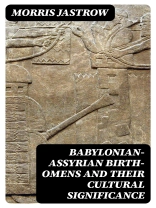Morris Jastrow’s ‘Babylonian-Assyrian Birth-Omens and Their Cultural Significance’ delves into the world of ancient Mesopotamian beliefs and practices surrounding the interpretation of birth omens. Through a meticulous examination of cuneiform texts and inscriptions, Jastrow explores the cultural significance of these omens in Babylonian and Assyrian societies, shedding light on the ways in which individuals in these ancient civilizations perceived and understood the events surrounding a child’s birth. His scholarly approach to the subject matter provides readers with a comprehensive study of the historical context and literary style of these ancient texts. This book serves as a valuable resource for anyone interested in the religious and cultural practices of the Babylonian and Assyrian civilizations, offering insights into the beliefs and superstitions that shaped the daily lives of these ancient peoples. Morris Jastrow’s expertise in ancient Mesopotamian studies and his dedication to preserving and analyzing historical texts make ‘Babylonian-Assyrian Birth-Omens and Their Cultural Significance’ a must-read for scholars and enthusiasts alike.
Sobre el autor
Morris Jastrow, Jr. (1861–1921) was an American orientalist and librarian, known for his extensive contributions to the field of Assyriology, the study of the ancient civilization of Mesopotamia. Born into an academic family, Jastrow pursued his passion for ancient languages and culture at the University of Pennsylvania, where he later became a professor of Semitic languages and served as the university librarian. His scholarly work is characterized by a meticulous examination of Assyrian and Babylonian religious and cultural practices. One of his notable works, ‘Babylonian-Assyrian Birth-Omens and Their Cultural Significance’ (1914), stands as a testament to his interest in divination and astrology as practiced in ancient Mesopotamia. This book, along with others like ‘Religion of Babylonia and Assyria’ (1898), showcases Jastrow’s ability to synthesize complex material and provide contextual analysis that has continued to influence Assyriologists and historians. Jastrow was also an active member of various learned societies and contributed to the broader understanding of Mesopotamian civilizations through his editorship for the ‘Journal of Biblical Literature.’ His literary style often combined rigorous scholarship with an accessible narrative, bridging the gap between academia and the educated public. Jastrow’s legacy is preserved in his numerous writings and his role in shaping the field of Assyriology during the late 19th and early 20th centuries.












